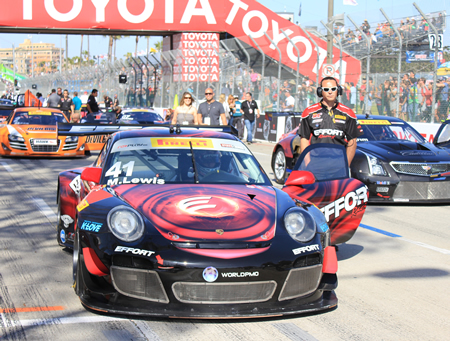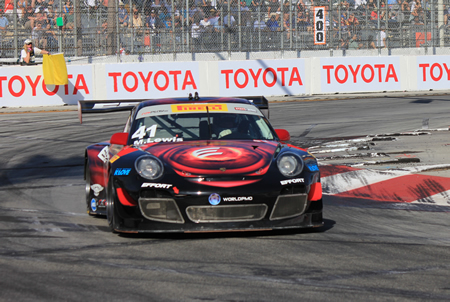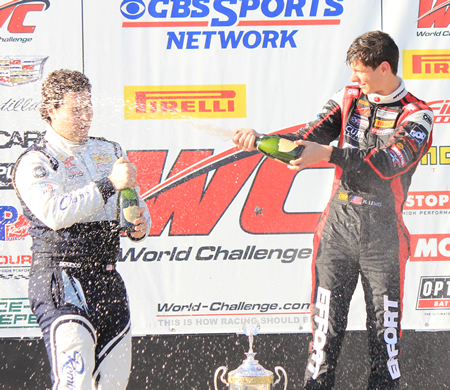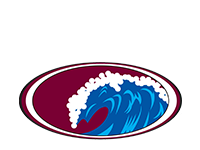
Laguna Beach native Michael Lewis won the amateur division of the Pirelli World Challenge on the streets of Long Beach this past Sunday, April 19, fulfilling a dream to follow in the tire tracks of countless racing greats who have competed on the famed course over the past 41 years.
“Long Beach is a fast track and very dangerous. And we made it happen today somehow,” said the 24-year-old who has been racing half his life.
The PWC Championship race was the final event of the day, starting after the conclusion of the 41st Annual Toyota Grand Prix won by Scott Dixon, who took the lead from Helio Castroneves on lap 49 of 80 and never relinquished it.
Only an hour before the biggest race of his career, Lewis looked relaxed in shorts, t-shirt and tennis shoes as he entertained a young fan in the Pirelli paddock, eager to meet the racers and see their cars. Lewis answered questions, posed for pictures and passed out free flags and hats. His demeanor seemed natural. As did his wide, youthful smile.

An hour later in helmet and full fire suit, Lewis sat strapped in his Porsche 911 on Shoreline Drive, his gaze fixed straight ahead as he listened to last minute instructions from a member of the Effort Racing Team.
He seemed oblivious to the swarm of photographers and fans buzzing around his car, clamoring for the perfect shot or selfie. “I’m just totally in the zone at the moment and just trying to get a good start,” he said.
The sport of racing demands that drivers shut out the world to focus on whatever it takes to get to the finish line first, Lewis explained. The business of racing, though, requires drivers to engage with fans and create excitement around the sport, the team and the car. Lewis can do both with equal aplomb.
Lewis grew up around racetracks and drivers. His father Steve is the former owner of Nine Racing, Inc., a sprint and midget car racing team that helped kick start the careers of legends Jeff Gordon, Tony Stewart and Kasey Kahne, among others.

An 8-year-old Lewis got his first opportunity to get behind the wheel of a quarter-midget racecar at a track in Indianapolis. With his dad and many others looking on, Lewis felt the pressure of heightened expectations, and the whole experience left a bad taste in his mouth.
Four years later in a vacant parking lot under his father’s watchful eye, Lewis turned laps on an improvised course behind the wheel of a go-kart. He was hooked. “I think there was just less pressure the second time,” Lewis said. “It was kind of more relaxed.”
As the son of a midget team owner, it seemed that Lewis was destined for oval track racing. He and his father even discussed the possibility of Lewis joining Team 9 at some point. But his father made sure Lewis understood that if he made the team, it was because he was good, “not because you’re my kid,” Lewis said.
Make no mistake. Lewis is good. He’s won four of the first five races in the Pirelli World Challenge this season. And he qualified first in the amateur division and sixth overall out of 40 cars at Long Beach. But his start was more timid than usual. “I just wanted to get off cleanly and not really run into anybody,” he said, referring mainly to teammate Ryan Dalziel, who was directly in front of him in an identical Porsche 911 GT3R.
Lewis has never been timid when it comes to driving something new and different. And it seems that no matter what kind of car he’s given, he finds a way to drive it to the front of the pack.

He began his career at 12 in quarter midget cars before switching gears to Kart racing. He climbed into midgets and stock cars, too, before moving to formula cars, earning top rookie status in Formula BMW circuits in the U.S. and Europe. He raced in Formula 3 cars in three different series over the next three years. “My school for racing was all in Europe,” he said.
With all his focus in Long Beach on getting a clean start, Lewis dropped from sixth to ninth before he even knew what happened. “It was pretty intense. Everybody’s fast, whether they’re pro or amateur,” he said.
The 50-minute timed race was plagued by several minor crashes, which brought out the yellow flags. Drivers are not allowed to pass under yellow, but they can close the gaps between cars.
Lewis used the time under yellow to get a better feel for the course. “It was kind of a blessing in disguise. I had a couple ideas and I applied them and they worked,” he said. “Once I saw how aggressive the people were off the line, my mindset was like, okay, let’s try and get this GTA win,” he said, referring to the amateur division. The PWC features three divisions that compete together in the same race.
On lap 20 after the final yellow flag of the day, Lewis made a move that put him in fourth overall. “To be honest, it was just kind of the right place at the right time,” he said. He pushed hard for the final four laps to win, barely holding off his nearest competitor. “The GTA guy in second place was right on my tail the whole time,” he said.
In PWC rules, amateurs move into the pro division with one outright win or with a fourth or fifth place finish in two consecutive races. After his fourth place overall finish in Long Beach, Lewis only need finish fourth or fifth overall this Sunday, April 26 at Barber Motorsports Park in Birmingham, Ala., to become a pro.
If he does move into the pro division, he will lose the opportunity to win the amateur division points championship. “We’re in the amateur class right now, and we’re going to try and win that,” he said. “If it happens that we go to pro, cool. If not, that’s fine too.”
The PWC Long Beach race can be seen in its entirety on CBS Sports Network Sunday, April 26 at 3:30 PM.




